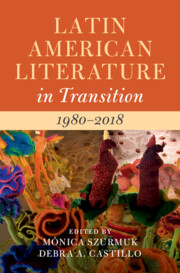Book contents
- Latin American Literature in Transition 1980–2018
- Latin American Literature in Transition
- Latin American Literature in Transition 1980–2018
- Copyright page
- Contents
- Contributors
- Acknowledgments
- Introduction
- Part I Security
- Part II New Genres
- Part III Mobilities
- Part IV Positionalities
- Part V Latin American Literature in Global Markets
- Chapter 22 Latin American Literature and Criticism in the Global Market
- Chapter 23 Memes in Brazilian Digital Culture
- Chapter 24 Mexican Transnational Cinema in the Twenty-First Century
- Index
- References
Chapter 22 - Latin American Literature and Criticism in the Global Market
from Part V - Latin American Literature in Global Markets
Published online by Cambridge University Press: 24 November 2022
- Latin American Literature in Transition 1980–2018
- Latin American Literature in Transition
- Latin American Literature in Transition 1980–2018
- Copyright page
- Contents
- Contributors
- Acknowledgments
- Introduction
- Part I Security
- Part II New Genres
- Part III Mobilities
- Part IV Positionalities
- Part V Latin American Literature in Global Markets
- Chapter 22 Latin American Literature and Criticism in the Global Market
- Chapter 23 Memes in Brazilian Digital Culture
- Chapter 24 Mexican Transnational Cinema in the Twenty-First Century
- Index
- References
Summary
During the last decade of the twentieth century, Latin American literary criticism completely redesigned its function. The cultural changes in the local and global scenes allowed this reconfiguration in the frame of neoliberal politics and economic crisis. Among the new conditions of the critical practice, we can mention the changes in the idea of literature and the new writing practices; the demands of professionalization in the universities; the emergence of cultural studies in the Anglo-Saxon academy; the crisis of the humanities; and a paradoxical proliferation of new journals and publishing houses. This chapter explores those changes, focusing on the institutional processes. In the context of globalization, the literary critic’s role was radically transformed. It also studies the local contexts of production of knowledge and the new forms of circulation of ideas, knowledges, and cultural practices. The introduction traces the links with the critical tradition of the 1960s in Latin America. The chapter then focuses on the dialogues that literary criticism – now transformed in cultural critique – establishes with different local cultural practices and exchanges with international theoretical thought.
- Type
- Chapter
- Information
- Latin American Literature in Transition 1980–2018 , pp. 341 - 355Publisher: Cambridge University PressPrint publication year: 2022

